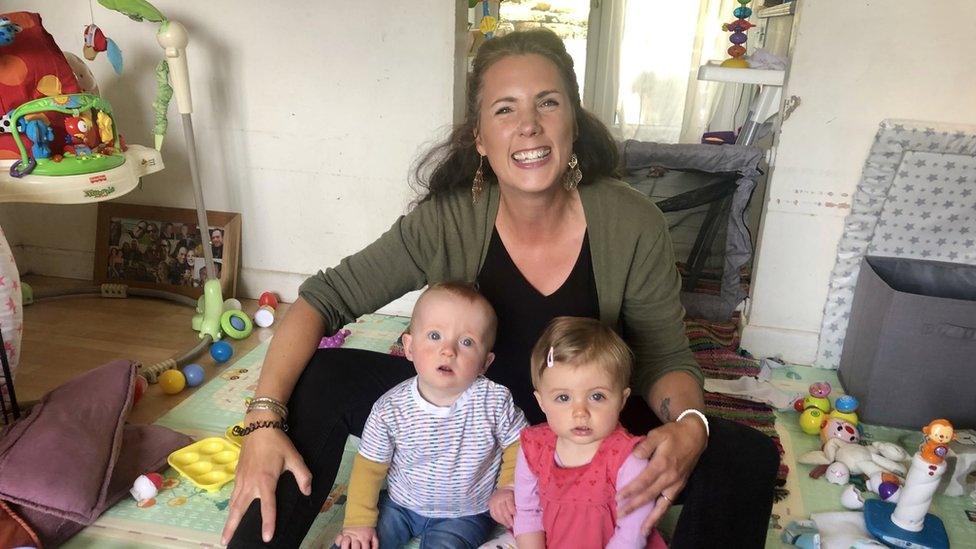Caught up in Cornwall's worsening housing crisis
- Published
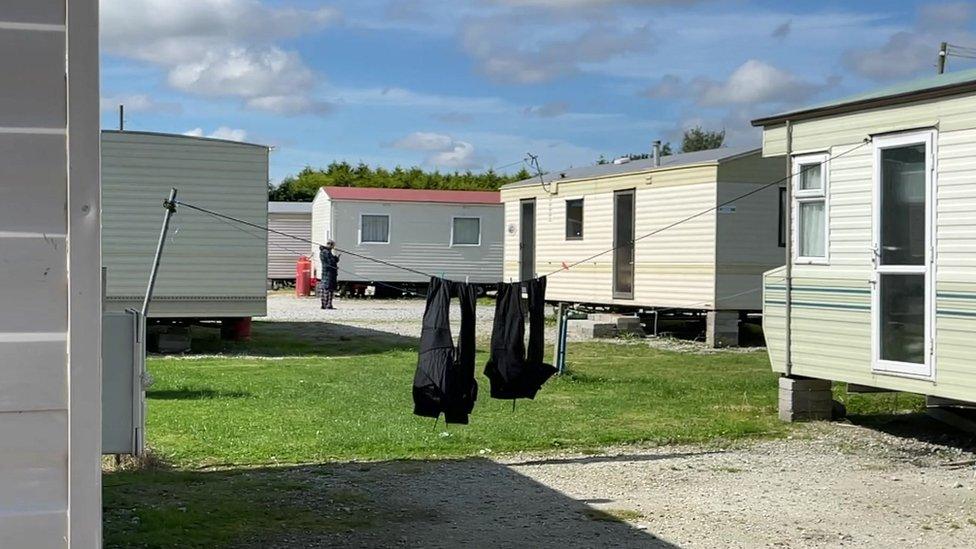
Cornwall Council has housed 69 homeless families in holiday parks and favours them over hotels or B&Bs
People caught up in a housing crisis say they are being moved around "like farm animals" and feel "abandoned" by a council.
Across Cornwall the number of people in emergency accommodation has risen to 1,500, up from about 1,000 a year ago.
Placed in B&Bs, hotels and holidays parks, they are often moved between places multiple times across months.
Cornwall Council said it was a "heart-wrenching" situation and had invested £300m to help tackle the crisis.
Emma, who did not want us to use her real name, has been living in a holiday park with her 12-month-old son near Newquay since January, said: "I feel like I've been abandoned, and nothing has been explained.
"I don't know what is going on with my case, or even if they [Cornwall Council] are working on it".
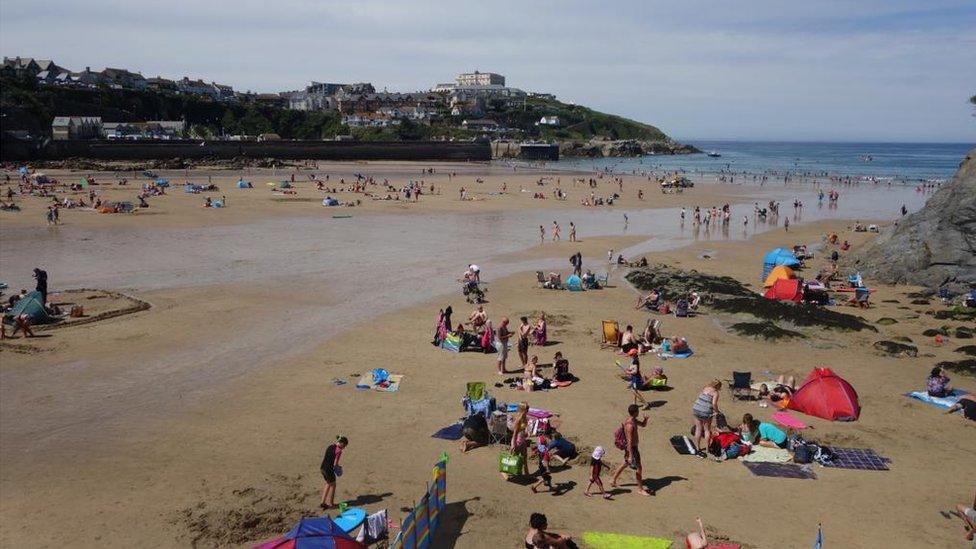
Cornwall Council said the staycation boom caused by coronavirus travel restrictions meant many landlords decided to tap into the holiday rental market
Having successfully rented without any problems for years, the supermarket worker suddenly found herself with nowhere to go last year.
A Section 21 no-fault eviction notice arrived at her home near Truro, and despite having six months to look, there was nothing affordable.
Landlords can legally evict tenants this way, external, so long as they give four months notice. The government has pledged to end no-fault evictions.
At 15:30 GMT on the day her notice period ended, she received a text message from the council telling her to move to a hotel in Fraddon, 13 miles (21km) away.
Four weeks later she said she was told to leave the hotel: "I was evicted again, waiting outside in the car park at the Premier Inn with all of my stuff and my baby boy, not knowing where I was going or what I was going to do.
"I was sat in my car ringing and ringing them [Cornwall Council]."
'I can't find anywhere'
She was eventually told to go to a "disgusting" hotel in Newquay, before being placed in the holiday park.
She said she was not sure how long she would remain at the site, or if she would be found a permanent home.
"I'm so frustrated. I'm bidding on so many houses but nothing is ever available.
"I've always private rented my whole life and always found somewhere to live. It is typical that now I've got my baby I can't find anywhere."

The Cornwall councillor in charge of housing, Olly Monk, said: "It's absolutely heart-wrenching to hear the plight of some of our families but there is not a magic wand for this.
"At the moment it is difficult to build as quickly as we want."
The local authority said it was the accommodation providers that decide when their rooms are available to homeless tenants, often on a day-by-day basis, meaning they cannot give more notice.
"I favour using more holiday park or park home style sites as it tends to be more on a week-by-week basis rather than a day-by-day basis, which you face with the hotel chains and B&B provider," Mr Monk said.
The council also said its services were under huge demand and "unfortunately each case takes a time to work its way through and provide people with the information that they demand".
'Take years to sort'
Last year the council announced £300m of measures to tackle the housing crisis, including modular cabins for homeless people, paying for space on holiday parks and acquiring a portfolio of properties to provide temporary accommodation.
A total of 814 homes classified as affordable were built in Cornwall in 2020-21, the second highest of any local authority in England, external.
Mr Monk said: "It's a sign of how pressured the system is that we keep seeing families coming to us who have been evicted because people are choosing to move out of the private rented sector. That's the threat that we have got right now.
"We have got an ongoing situation that is going to take years to sort out, and the council is moving heaven and earth to provide much needed accommodation for families and for all people in Cornwall to make sure they have a safe, secure, permanent home free from the threat of eviction."
The number of people on the council's housing waiting list has jumped from 10,947 in 2019 to 21,501 last month.
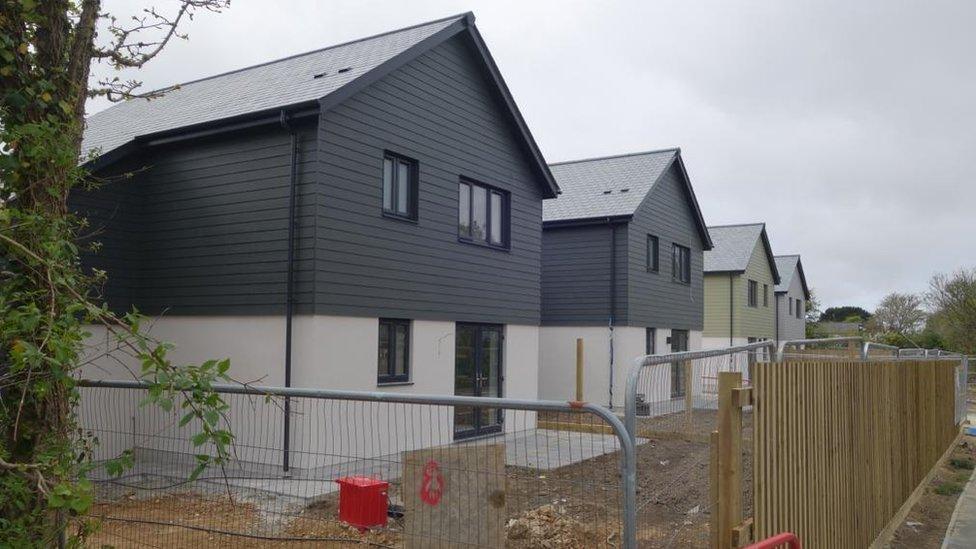
Cornwall built the second highest number of homes classified as affordable in England last year, with 814
On another holiday park near Falmouth, Keith - not his real name - is living in a caravan with his two children.
They are one of 69 families being housed on holiday parks by Cornwall Council.
They have been there for a few weeks after being moved five times since January, between two hotels and three holiday parks.
"It's been an absolute nightmare," Keith said.
"We are settling in here now and hopefully we won't have to move again until we get somewhere permanent."
"I'm trying to get the council to update me but they don't want to call me back. I made a complaint and someone called me, but that was two weeks ago and I still don't know what is happening."
Each time they have moved, Keith said he had only been told where to go on the day itself.
The holiday park staff are helpful, and the three of them are fairly comfortable in the caravan, but Keith is frustrated at having no idea how close they are to being found somewhere permanent to live.
"We are like farm animals. As long as we are in a certain pen we don't matter. We are just a bunch of farm animals that need a place to stay - that's is how it comes across," he said.
'It is scary'
The cost of living increases are having an impact too, with 250 miles a week of school runs costing him a "seriously hefty amount of money".
"I was just sitting there thinking last night that I'm now almost 40. I've got my two kids with me and we are homeless. We haven't got anything apart from clothes, my car and some of the kids' toys.
"I have to rebuild my whole life all over again and it is scary. Not knowing where you are going to be or what you are going to do. It's really scary."
Two of the newest arrivals on Keith's holiday park are 81-year-old Vilna, who is in a caravan with her friend, David, who is 63 and cares for her.
At the end of last year they were served an eviction notice, and so in March were placed in a Premier Inn near Helston.
After a month there, they said they were told to leave and drive 65 miles (105km) to Saltash, at 19:00 BST.
They got lost and did not arrive until midnight, had one night in a hotel, before being told the next day to get back in the car and drive back down to the holiday park they are now on near Falmouth.
"It is comfortable here but all our belongings are in storage, the cats are in the cattery and we haven't got a clue what is going on," David said.
Families that have been evicted from their rental properties are struggling to find anywhere to move that is suitable and affordable.
The list opens every Thursday morning, with people able to bid for suitable places until midnight on Monday.
10,500The number of properties Cornwall Council has. They are currently "absolutely full".
£60,000Maximum household income, with assets lower than £50,000.
1The number or properties you can bid on each week.
Jane, not her real name, and her husband have four children and have rented privately in a village near Wadebridge for the last two years.
They have until 26 May to get out, and she has applied for more than 70 properties without any success.
"Every three-bed between Bude and Penzance I have applied for," she said. "I feel broken."
The council has told her they may have to move to Wales as accommodation options are running out, especially with the busy summer season beginning.
Her husband works long hours in a food factory near Newquay, and her children are all at school in the area.
Two of her children also have SEN issues and another option is that they are housed in two separate locations.
Jane said: "I won't do it. It's a horrible situation to be in."
Their current rent is £1,000 per month, with council tax of about £200, which she says is "already stretching it" in terms of their budget.
She said suitable places are now £1,400 to £1,600, but "my husband is still earning the same money and I get the same carers allowance - it's lunacy".
'I feel guilty'
She has applied for places through the housing register but said "it's disheartening - one week I checked for a place I applied for and I was in 189th place".
She has been told they will be informed on the day their tenancy ends, on 26 May, if no solution is found before then.
"All four of my kids are constantly asking where we are moving to. How do you explain to small children? It is terrifying. I am terrified, and I can't imagine how they feel.
"I feel guilty. We have rented for 12 years and always managed to find somewhere to live and now I can't.
"It is the most soul-destroying thing because you feel guilt as a parent you can't give your child that security of a home. It is hard."

Second homes and holiday rentals
Part of the reason for the chronic shortage of properties to rent is closely linked to Cornwall being a place popular for people buying second homes.
Some second homes are being taken off the long-term rental market, as landlords switch to holiday-rentals.
Mr Monk called on second home owners and landlords to "think about the social consequences" of switching uses.
He said: "The staycation boom won't last and eventually people will start going back to Benidorm and Ibiza in numbers. So if you can see through the short-term gain and you can afford to keep people in your properties then please do so."
A spokesperson from the National Residential Landlords Association, said recent taxation policies have made "short-term holiday lets more tax efficient than providing long-term homes".
It has called on the government to review this and provide a "significant stimulus package to help responsible landlords deliver much-needed rental homes".

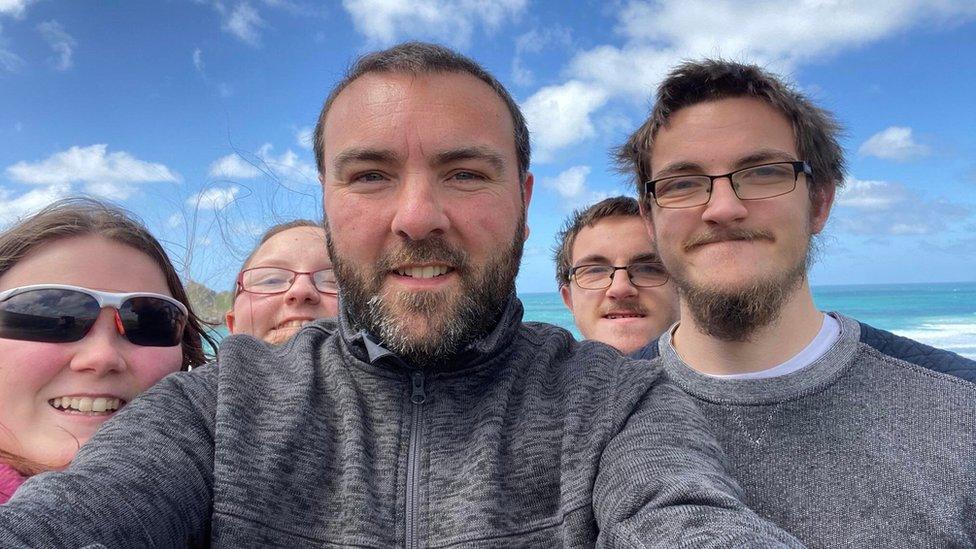
Marcus Jose is struggling to find suitable accommodation for his family
For the last eight years Marcus Jose has rented a three-bedroom house in Redruth, the town he was born in, but received an eviction notice at the end of March.
The photographer has four children aged between 17 and 21, all of whom have additional needs.
He said: "It is owned by an old couple who don't live in Cornwall, and they have decided to sell.
"I've been doing everything I can, but any suitable properties that do come up, the prices are prohibitive. I've been paying £695 a month but they want £1,200 to £1,400.
"Lettings agents aren't getting back to me and I don't know what we are going to do."
He is on the Cornwall housing register but said it was dispiriting to be so far down the list on any places he bids for.
"I have a sense of despair," he said.

What is the government doing to tackle the crisis?
Cornwall Council said it was putting pressure on the government, but "until we get the legislation from central government to control the amount of properties that can be used in the holiday sector we are always going to struggle to get the supply to meet the demand".
A Department for Levelling Up Housing and Communities spokesperson said: "We're taking action to combat the adverse impact that holiday lets can have on local communities - particularly in tourist areas such as Cornwall - by closing tax loopholes on second homes, introducing higher rates of stamp duty and empowering councils to charge the full council tax rate.
"Councils can also restrict properties' use as holiday lets under the Right to Buy scheme, and our First Homes scheme is helping first-time local buyers to stay in the communities where they live and work."

Follow BBC News South West on Twitter, external, Facebook, external and Instagram, external. Send your story ideas to spotlight@bbc.co.uk, external.
- Published23 September 2021
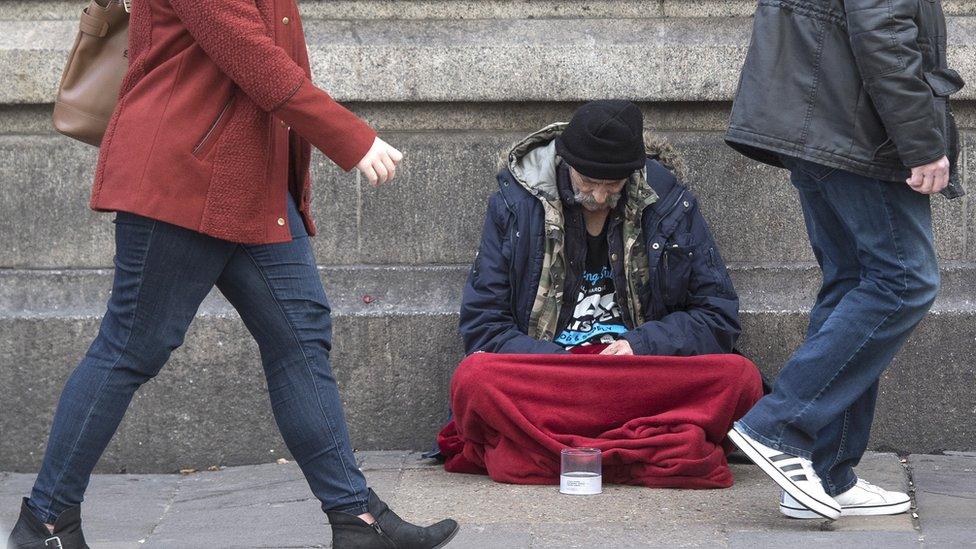
- Published21 September 2021
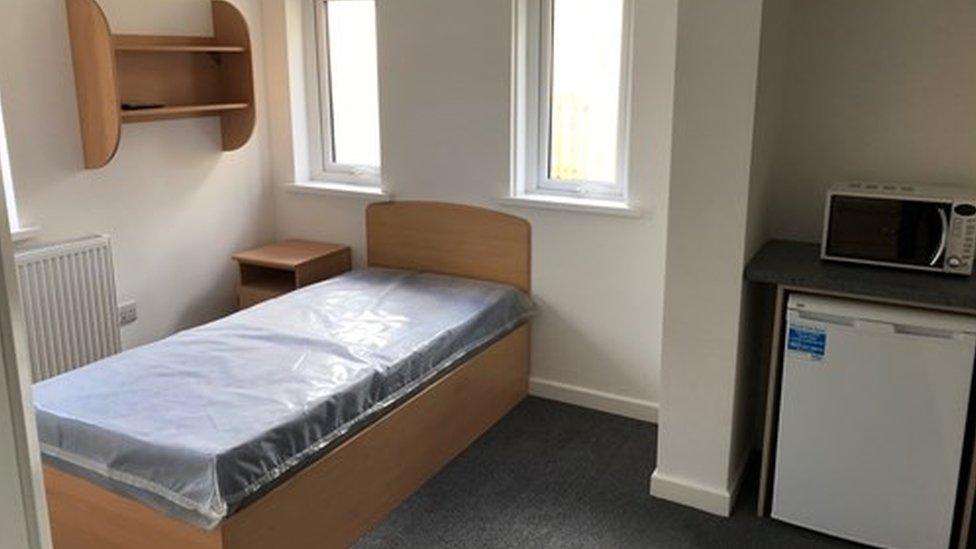
- Published22 August 2021
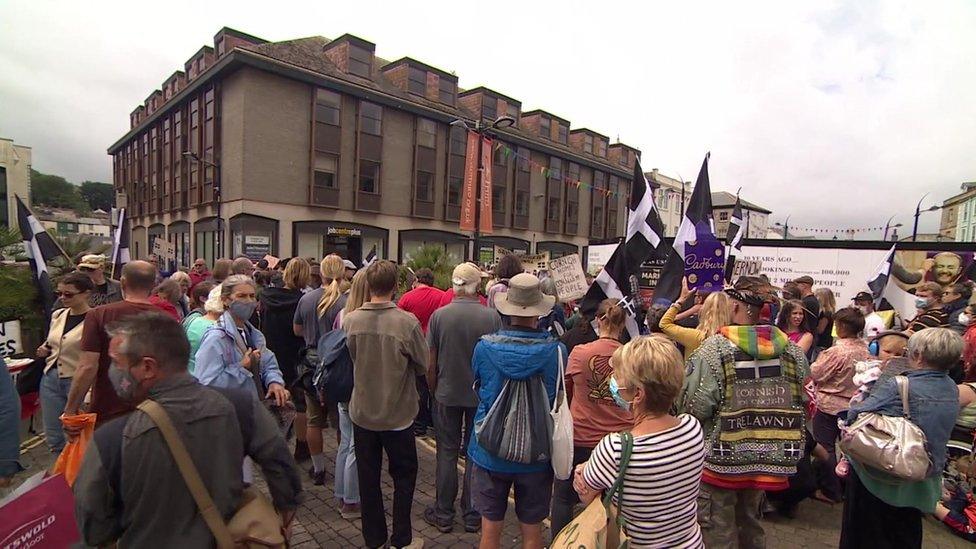
- Published29 June 2021
